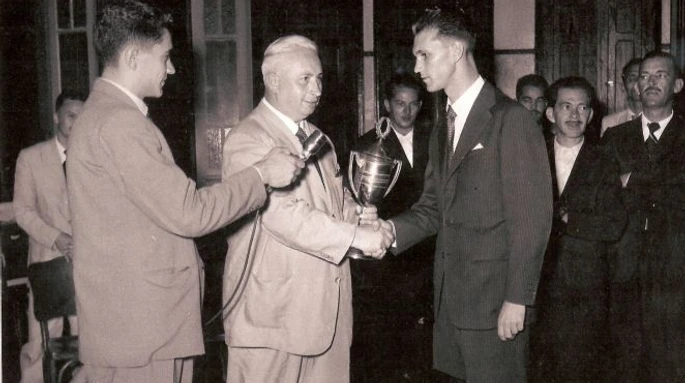“
In the USSR, the name of Vladimir Bakumenko was banned – for the same reason as the name of Fyodor Bogatyrchuk. Therefore, it is necessary to fill this historic white spot.
Talking about Kuperman’s Isara, we mentioned the existence of several varieties of checkers. These include, in particular, Brazilian checkers popular in Brazil, Poland, Philippines, Lithuania and other countries. According to the rules, Brazilian checkers are close to Russian, they also play a 64-cell board, but according to the rules of international checkers.
In Brazil not only play football The great enthusiast of Geraldo Isido Da Silva has been engaged in promoting the game in Brazil since the 1930s. He wrote and published two books, regularly publications in O Guri and A Cigarra, organized tournaments and tasks. He promoted both 100-cell and 64 cell checkers and sought to combine their rules.
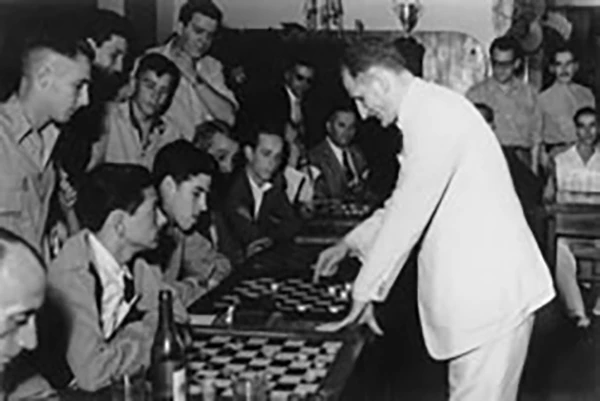 Geraldino Isidoro da Silva during a simultaneous play session
Geraldino Isidoro da Silva during a simultaneous play sessionGeraldino was a strong support in the early 1950s, when former Soviet Grasmaster Volodymyr Bakumenko, the USSR champion of 1927, immigrated to Brazil.
The Ukrainian worked as an accountant at a construction company and in his spare time resumed his chess activity. He launched an extremely wide job in promoting this sport, speaking with numerous publications in magazines, lecturing, giving sessions and helping Brazilian chesskars with coaching guidelines. Bakumenko was one of the sponsors of the Brazilian checkers, founded in 1952.
In July 1954, Vladimir (then on Brazilian manir – Valdemar) Bakumenko began his weekly column DAMAS (Checkers) in the A Gazeta and A Gazeta Esportiva newspapers, which were one of San Paulo’s most important editions at that time. Thus, he promoted the work started by Geraldino wasidora in Rio de Janeiro in the late 1930s.
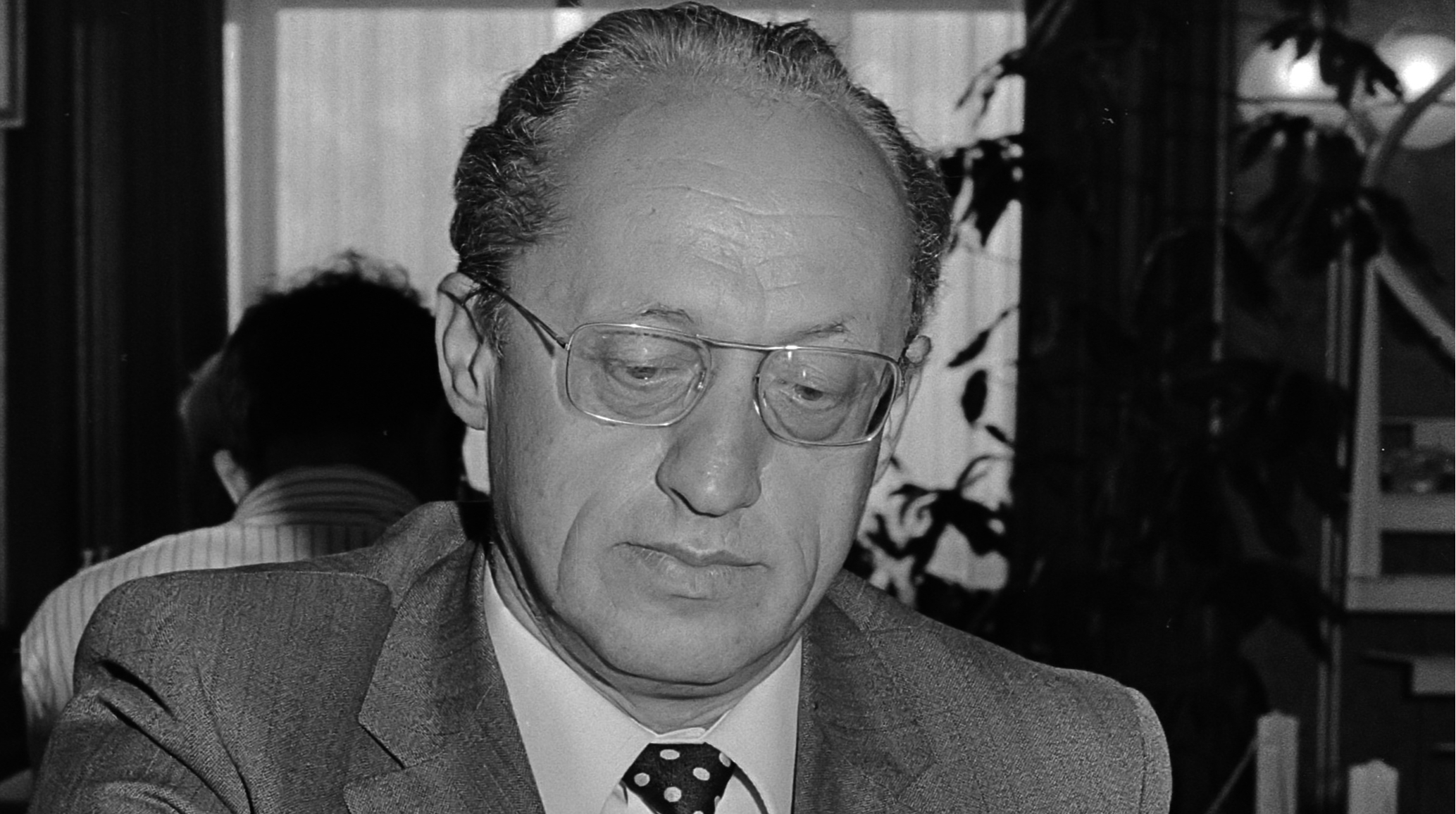
In March 1958, Valdemar Bakumenko began to lead the most famous checker column in the country COluna do Damista In the A Gazeta Esportiva newspaper, which has been published continuously every Saturday for 11 years. He led her until his death in May 1969.
In 1963, the Federation of San Paulo checkers was established and the first San Paulo Championship was organized, the winner of which was Valdemar Bakumenko. He, as a deep checker expert, began to promote more advanced techniques and distribute the names of debuts and combination topics. Having a thorough technical knowledge, Bakumenko encouraged the practice of the game, mainly because of his weekly column in the A Gazeta Esportiva newspaper. He organized chess groups himself and was an inspiration for creating many others. The Ukrainian published two books: Jóias Do Jogo De Damas (“Pearls of Game in Checkers”, 1959) and Curso Das Damas Brasileiras (“Course in Brazilian Checkers”, released 1979).
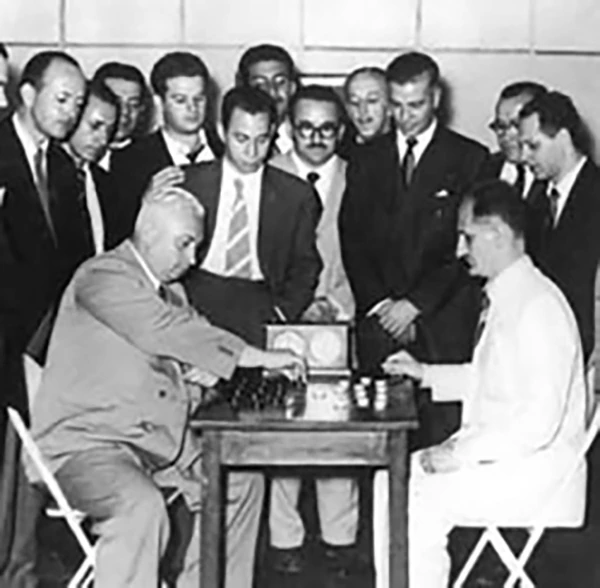 Vladimir Bakumenko (left) against Geraldino Isidoro da Silva
Vladimir Bakumenko (left) against Geraldino Isidoro da SilvaThe agreed efforts of Valdemara Bakumenko in San Paulo and Geraldino Isidoro in Rio de Janeiro brought their fruits. The 1960s became a time of great development of checkers in Brazil. In particular, in 1967, Bella Orizonti organized the largest Brazil Championship of checkers, which collected 1009 participants.
Thanks to such success, Brazilian checkers have entered the international arena. Since 1985, the World Championships in Brazilian checkers have been held. In 1993, Kuperman was one of the four grandmasters who divided the first place and the championship title at Aguas de Lindoi (Brazil) tournament. And in 2004 in Ubatuba (Brazil) the Ukrainian Grandmaster, Kharkiv resident Yuri Anikeyev, the same one who was disqualified in 2017 for the “violation of the ethics code of the International Federation Federation” (in 2017publicly Putin criticized and played in embroidery).
Now let’s get back to the difficult fate of Vladimir Bakumenko.
The history of the champion-exile Volodymyr Mikhailovich Bakumenko was born in 1909 in Kharkiv. He learned to play checkers quite late – at the age of 17 at a sports club, where he was engaged in the football section in parallel.
In 1926, Vladimir took part in a session of simultaneous matches at the proposal of a checker club coach. The guy won the match, and in a few months he managed to win the club championship.
Thus began the rapid growth of his career as an athlete-scaly, in 1926 Bakumenko won the Kharkiv Championship. And the following year, the 18-year-old students of the construction technical school became the champion of the Soviet Union. And this despite the fact that he got to the tournament due to the fact that Ukraine was given extra place. And for this place, Bakumenko played a match against the Vicechiopion of the USSR Boris Ilyinsky, who beat with a minimal advantage (+3-2 = 1).
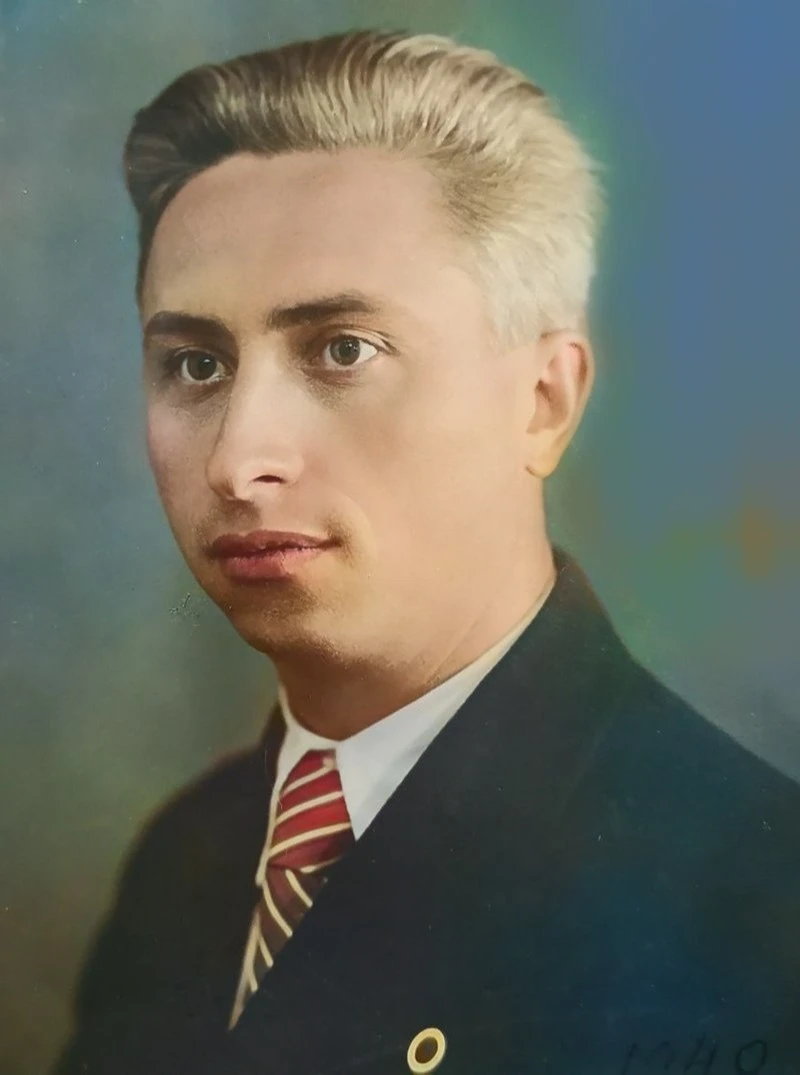 Vladimir Bakumenko
Vladimir BakumenkoThe 3rd USSR Championship of Russian Checkers was held in Moscow on October 13-24, 1927. 22 athletes took part in the competitions. No one expected that a young Kharkiv debutant would become a champion. However, Bakumenko divided 1-2 places with the Moscow master Sergei Sokolov (13.5 points), and in an additional match the Ukrainian defeated an experienced opponent (+1 = 3). At first there were three draws and the fourth party defeated youth.
According to the results of the championship, Vladimir Bakumenko and five more participants received the title of master of sports of the USSR. After the championship, a collection of selected 50 parties was published, edited by Leonid Rubychik, with comments of seven participants, the first of which was Vladimir Bakumenko.
In 1928, the All-Union Chess and Shahkov Section decided to play the title of champion of the USSR in a match between Vladimir Bakumenko and the USSR champion in 1924 and 1925 Vasyl Medkov. The 38 -year -old Medkov, the editor of the Checker Department of the Gudok newspaper, won the match: (+6 = 10 -4).
Bakumenko no longer participated in the Soviet championships, playing only in the championships of Ukraine. In 1928 he took second place at the Ukrainian Championship in Odessa.
In the 1930s, Bakumenko received his higher education in the specialty “Engineer-Technologist”. In 1932, his book “The Textbook of the Cheash Game”, written in co -authorship with Boris Ilyinsky, was published. And in 1941, a book “Conversations about a checker game” was published in Kharkiv. Already at that time, Bakumenko proved himself as an active propagandist of the chess game.
In 1940, Vladimir Bakumenko divided 1-4 places with young Kuperman, USSR champion in 1934 by the USSR Champion Boris Boris Blinder and Kharkiv resident Vladimir Mogilevich in 1940 in 1940. In the additional match-tournament of four for the title of champion surprised The 17-year-old Mogilevich, who turned out to be the same “Kinder Surprise”, which was Bakumenko on the USSR championship in 1927. In four years he will die at the front in the Second World War.
Bakumenko remained in occupied Kharkiv during the war, where she kept cheeshop in the New Ukraine newspaper. In 1943 he went with conquerors to Germany. And in 1950, after staying in the US occupation zone, he went to Brazil.
By the way, his younger brother Gregory (born in 1914), who since 1936 served in the Red Army, fought at the front in the rank of lieutenant and was awarded the Order of the Red Star.
Everyone has their own destiny …
He played for a chess crown against Botvinnik and opposed the regime: Genius of the 20th Century from Ukraine David Bronstein
On May 15, 1969, in the Gazeta Esportiva newspaper, where Valdemar Bakumenko was a chess column for 11 years, the news was signed by the Director of the San Paulo San Paulo Federation Karlos Alberto. He reported that Valdemar Bakumenko died on May 13 at the age of 61 in the oncology department of the city hospital. The funeral of the chess game was held on May 14, 1969.
The fact that Brazilian checkers have gained international recognition, there is an exceptional merit of the Ukrainian – which is constantly emphasized in their publications by Brazilian authors.
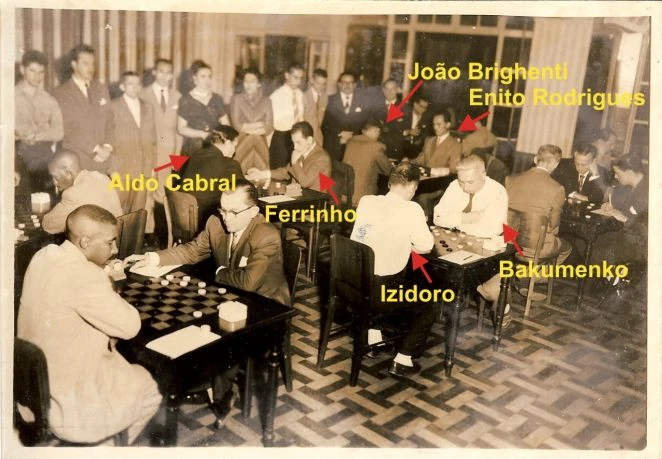
Here are seven “golden rules” Bakumenko, who helped to create an ethical profile of Brazilian checkers:
”, – WRITE: Champion.com.ua
In the USSR, the name of Vladimir Bakumenko was banned – for the same reason as the name of Fyodor Bogatyrchuk. Therefore, it is necessary to fill this historic white spot.
Talking about Kuperman’s Isara, we mentioned the existence of several varieties of checkers. These include, in particular, Brazilian checkers popular in Brazil, Poland, Philippines, Lithuania and other countries. According to the rules, Brazilian checkers are close to Russian, they also play a 64-cell board, but according to the rules of international checkers.
In Brazil not only play football The great enthusiast of Geraldo Isido Da Silva has been engaged in promoting the game in Brazil since the 1930s. He wrote and published two books, regularly publications in O Guri and A Cigarra, organized tournaments and tasks. He promoted both 100-cell and 64 cell checkers and sought to combine their rules.
 Geraldino Isidoro da Silva during a simultaneous play session
Geraldino Isidoro da Silva during a simultaneous play sessionGeraldino was a strong support in the early 1950s, when former Soviet Grasmaster Volodymyr Bakumenko, the USSR champion of 1927, immigrated to Brazil.
The Ukrainian worked as an accountant at a construction company and in his spare time resumed his chess activity. He launched an extremely wide job in promoting this sport, speaking with numerous publications in magazines, lecturing, giving sessions and helping Brazilian chesskars with coaching guidelines. Bakumenko was one of the sponsors of the Brazilian checkers, founded in 1952.
In July 1954, Vladimir (then on Brazilian manir – Valdemar) Bakumenko began his weekly column DAMAS (Checkers) in the A Gazeta and A Gazeta Esportiva newspapers, which were one of San Paulo’s most important editions at that time. Thus, he promoted the work started by Geraldino wasidora in Rio de Janeiro in the late 1930s.

In March 1958, Valdemar Bakumenko began to lead the most famous checker column in the country COluna do Damista In the A Gazeta Esportiva newspaper, which has been published continuously every Saturday for 11 years. He led her until his death in May 1969.
In 1963, the Federation of San Paulo checkers was established and the first San Paulo Championship was organized, the winner of which was Valdemar Bakumenko. He, as a deep checker expert, began to promote more advanced techniques and distribute the names of debuts and combination topics. Having a thorough technical knowledge, Bakumenko encouraged the practice of the game, mainly because of his weekly column in the A Gazeta Esportiva newspaper. He organized chess groups himself and was an inspiration for creating many others. The Ukrainian published two books: Jóias Do Jogo De Damas (“Pearls of Game in Checkers”, 1959) and Curso Das Damas Brasileiras (“Course in Brazilian Checkers”, released 1979).
 Vladimir Bakumenko (left) against Geraldino Isidoro da Silva
Vladimir Bakumenko (left) against Geraldino Isidoro da SilvaThe agreed efforts of Valdemara Bakumenko in San Paulo and Geraldino Isidoro in Rio de Janeiro brought their fruits. The 1960s became a time of great development of checkers in Brazil. In particular, in 1967, Bella Orizonti organized the largest Brazil Championship of checkers, which collected 1009 participants.
Thanks to such success, Brazilian checkers have entered the international arena. Since 1985, the World Championships in Brazilian checkers have been held. In 1993, Kuperman was one of the four grandmasters who divided the first place and the championship title at Aguas de Lindoi (Brazil) tournament. And in 2004 in Ubatuba (Brazil) the Ukrainian Grandmaster, Kharkiv resident Yuri Anikeyev, the same one who was disqualified in 2017 for the “violation of the ethics code of the International Federation Federation” (in 2017publicly Putin criticized and played in embroidery).
Now let’s get back to the difficult fate of Vladimir Bakumenko.
The history of the champion-exile Volodymyr Mikhailovich Bakumenko was born in 1909 in Kharkiv. He learned to play checkers quite late – at the age of 17 at a sports club, where he was engaged in the football section in parallel.
In 1926, Vladimir took part in a session of simultaneous matches at the proposal of a checker club coach. The guy won the match, and in a few months he managed to win the club championship.
Thus began the rapid growth of his career as an athlete-scaly, in 1926 Bakumenko won the Kharkiv Championship. And the following year, the 18-year-old students of the construction technical school became the champion of the Soviet Union. And this despite the fact that he got to the tournament due to the fact that Ukraine was given extra place. And for this place, Bakumenko played a match against the Vicechiopion of the USSR Boris Ilyinsky, who beat with a minimal advantage (+3-2 = 1).
 Vladimir Bakumenko
Vladimir BakumenkoThe 3rd USSR Championship of Russian Checkers was held in Moscow on October 13-24, 1927. 22 athletes took part in the competitions. No one expected that a young Kharkiv debutant would become a champion. However, Bakumenko divided 1-2 places with the Moscow master Sergei Sokolov (13.5 points), and in an additional match the Ukrainian defeated an experienced opponent (+1 = 3). At first there were three draws and the fourth party defeated youth.
According to the results of the championship, Vladimir Bakumenko and five more participants received the title of master of sports of the USSR. After the championship, a collection of selected 50 parties was published, edited by Leonid Rubychik, with comments of seven participants, the first of which was Vladimir Bakumenko.
In 1928, the All-Union Chess and Shahkov Section decided to play the title of champion of the USSR in a match between Vladimir Bakumenko and the USSR champion in 1924 and 1925 Vasyl Medkov. The 38 -year -old Medkov, the editor of the Checker Department of the Gudok newspaper, won the match: (+6 = 10 -4).
Bakumenko no longer participated in the Soviet championships, playing only in the championships of Ukraine. In 1928 he took second place at the Ukrainian Championship in Odessa.
In the 1930s, Bakumenko received his higher education in the specialty “Engineer-Technologist”. In 1932, his book “The Textbook of the Cheash Game”, written in co -authorship with Boris Ilyinsky, was published. And in 1941, a book “Conversations about a checker game” was published in Kharkiv. Already at that time, Bakumenko proved himself as an active propagandist of the chess game.
In 1940, Vladimir Bakumenko divided 1-4 places with young Kuperman, USSR champion in 1934 by the USSR Champion Boris Boris Blinder and Kharkiv resident Vladimir Mogilevich in 1940 in 1940. In the additional match-tournament of four for the title of champion, 17-year-old Mogilevich suddenly won, which turned out to be the same “Kinder-Surprise”, which was Bakumenko at the USSR championship in 1927. In four years he will die at the front in the Second World War.
Bakumenko remained in occupied Kharkiv during the war, where she kept cheeshop in the New Ukraine newspaper. In 1943 he went with conquerors to Germany. And in 1950, after staying in the US occupation zone, he went to Brazil.
By the way, his younger brother Gregory (born in 1914), who since 1936 served in the Red Army, fought at the front in the rank of lieutenant and was awarded the Order of the Red Star.
Everyone has their own destiny …
He played for a chess crown against Botvinnik and opposed the regime: Genius of the 20th Century from Ukraine David Bronstein
On May 15, 1969, in the Gazeta Esportiva newspaper, where Valdemar Bakumenko was a chess column for 11 years, the news was signed by the Director of the San Paulo San Paulo Federation Karlos Alberto. He reported that Valdemar Bakumenko died on May 13 at the age of 61 in the oncology department of the city hospital. The funeral of the chess game was held on May 14, 1969.
The fact that Brazilian checkers have gained international recognition, there is an exceptional merit of the Ukrainian – which is constantly emphasized in their publications by Brazilian authors.

Here are seven “golden rules” Bakumenko, who helped to create an ethical profile of Brazilian checkers:
